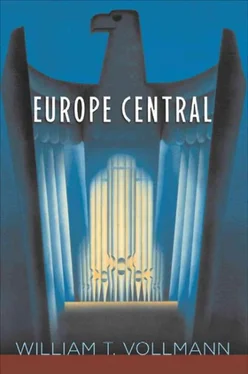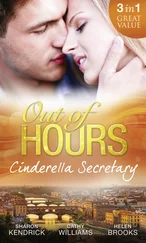The International Who’s Who, 1977-78 informs us that in 1962 Karmen married Maya Ovchinnikova. So he and Elena must have divorced before then.
Khentova writes that Elena married a Professor Vigodsky, to whom she bore a daughter, but gives no date. Khentova further states that although Elena kept in touch with some of Shostakovich’s relatives, particularly his sister Mariya, she saw Shostakovich only once more. All the same, she saved his letters to the end of her life, which she could have done for any number of reasons, but why not suppose that she held a torch for him?
It is unlikely that Shostakovich never got over Elena, as has been imagined in this book. There is equally no reason to suppose that Elena’s marriage with Karmen failed because she was still in love with Shostakovich. Moreover, Elena was blonde, not darkhaired, and I have no grounds whatsoever for believing her to have been a bisexual cigarette smoker. Shostakovich held somewhat traditional views about women (for instance, he did not express much respect for female composers, which was a point of contention between him and Galina Ustvolskaya), so I can’t be confident that he could have tolerated a bisexual mistress.
When I think of Shostakovich, and when I listen to his music, I imagine a person consumed by fear and regret, a person who (like Kurt Gerstein) did what litttle he could to uphold the good—in this case, freedom of artistic creation, and the mitigation of other people’s emergencies. He became progressively more beaten down, and certainly experienced difficulty saying no—a character trait which may well have kept him alive in the Stalinist years. In spite of the fact that he joined the Party near the end, to me he is a great hero—a tragic hero, naturally. Richard Taruskin writes in Defining Russia Musically (p. 537) “How pleasant and comforting it is to portray him as we would like to imagine ourselves acting in his shoes”—in other words, as being a member of some fairytale anti-Soviet Resistance, which would have instantly led him to share Vlasov’s fate.
His marriage to Nina Varzar was unhappy in a number of ways, and I wanted to give him, in fiction, at least, a great love—which he might well have experienced with his last wife, Irina. Because in Europe Central his passion for Elena dominates his life to the end, including his years with Irina, I beg her pardon, and likewise his children’s, for any misrepresentations which this book’s objectives required.
Roman Karmen was not a great artist, but he was a brave, adventurous sort whom it would now be all too easy to dismiss as a Stalinist propagandist. He and Käthe Kollwitz may fairly be called fellow propagandists, although to my mind the latter was by far the former’s superior from the “aesthetic” point of view. Karmen’s documentaries deserve more attention than they have received. I imagine him, plausibly I believe, as a passionate “soldier with a camera” who did his best. I suspect that he was also cheerful and likeable. He very well might have tried to assist Shostakovich as I have imagined in “Opus 110,” although here again, by magnifying Shostakovich’s obsession with Elena, I have surely exaggerated the number of thoughts which our composer sent Karmen’s way. In any event, I respect both men’s memories.
What about Elena Konstantinovskaya? She remains an enigma to me. But I certainly love her as much as I can love someone I never knew. I had various reasons for making my version of her to be capable of love for both men and women. One motive was to make her as infinitely lovable as I could. As I’ve written in this book, “above all Europa is Elena.”
I would like to thank my father for our three days in Berlin and Dresden during July 2001. “The Last Field-Marshal,” “Opus 110” and “Woman with Dead Child” were the principal beneficiaries. It was wonderful to see both my parents in Berlin in 2003, when I got to take a few more notes.
The American Academy in Berlin very kindly made me writer-in-residence for September 2003, a highly fortuitous, almost voluptuous circumstance which benefited almost all the German stories. The person who made this happen was George Plimpton of the Paris Review. Mr. Plimpton died before I returned home from Germany; I wish I had been able to thank him at greater length. I also wish to thank my colleagues at the Academy for their friendship. In particular, the eth-nomusicologist Philip Bohlman, professor of music and Jewish studies at the University of Chicago, who was a fellow at the American Academy, helped me considerably, both in translating certain musical terms from East German critical essays on Shostakovich and in answering several of my questions about motif and leitmotiv in music. Juliane Reitzig, an intern at the Academy, answered some questions about growing up in the DDR.
Although I paid her well, and I am usually too sour to acknowledge people I pay, the more I think about the help she gave this book, the more grateful I am to Fr. Yolande Korb at the Academy. This research assistant and interpreter beyond dreams took me to Ullstein Bilderdienst and to several other places, got me whatever library books I wanted, etcetera. She was also very patient with my stumbling confusion (I was on narcotic painkillers the entire time she knew me, thanks to a broken pelvis).
The photographic archives of Ullstein Bilderdienst in Berlin proved to be as rich as the Nibelungen hoard. I hereby express my gratitude to that establishment, without which I would never have seen quite so many images of the Condor Legion, Operation Zitadelle, Hilde Benjamin, Fredrich Paulus, Kurt Gerstein, and various German tanks; nor certainly would I have known such splendors as the eyelashes of Lisca Malbran.
Dr. Gudrun Fritsch, curator at the Käthe-Kollwitz-Museum in Berlin, put up with my poor spoken German and gave me useful references and advice for “Woman with Dead Child.”
Mr. Thomas Melle, also of Berlin, very kindly and exactly corrected quite a number of mis-Germanisms, mainly of syntax but once or twice of personality as well. He also gathered a heavy load of books about Hilde Benjamin for me when I couldn’t carry much myself, thanks to a broken pelvis. I am extremely grateful to him.
I appreciate the last-minute help of Nina Bouis; whose advice about vruchka versus ruchka I ultimately followed.
(Now that I have written the previous paragraph, I hereby double and triple it, for Thomas has since read the entire manuscript, patiently saving me from many more of my multifarious ignorances. Thank you so much, my friend.)
Chris Chang of Film Comment magazine in New York was very helpful with Roman Karmen contacts and references. He also caught two inconsistencies in my draft of “The White Nights of Leningrad.” Among other favors, he introduced me to University of Chicago film expert Yuri Tsivian, who gave me his views on the professional accomplishments of Roman Karmen, and I have accordingly quoted this verbatim in “Far and Wide My Country Stretches.”
Mr. Heinz Riedel Lehmann of Berlin told me some interesting stories about Paulus in his Soviet captivity; bits of these found their way into this book. In Berkeley, Kara Platoni, whom I hired to do some research on Elena Konstantinovskaya, was very efficient and nice; through her I certainly ought to thank Alan Mercer, editor of the DSCH Journal.
Jean Stein was her usual altruistic self with books and introductions.
David M. Golden was extremely generous with his books, his knowledge about Judaism and the Holocaust, and his time. He even found me three excellent German translators, who were all a pleasure to work with and whom I’d like to thank here: Pastor Andreas Pielhoop, Elsmarie Hau and Tracey Bigelow, the last of whom put me in contact with Sergi Mineyev, whose rapid translation from the Russian of some selections in Khentova’s biography of Shostakovich saved me much worry and strain.
Читать дальше












